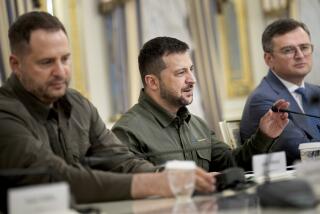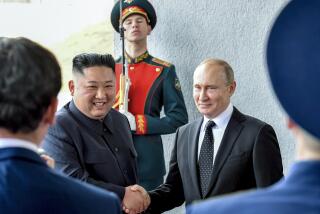Donât Expect Direct Aid, Bush to Tell Gorbachev : Economic summit: The President plans to send a letter to head off any Soviet move to embarrass West.
WASHINGTON â President Bush plans to send a letter to Soviet President Mikhail S. Gorbachev this week warning him not to expect any direct financial aid from the United States and its allies, senior U.S. officials said Tuesday.
The message is part of a concerted effort by the Bush Administration to lower Gorbachevâs expectations about his meeting with the leaders of the worldâs wealthiest countries next week--and to head off any impulse on the Soviet leaderâs part to embarrass them by asking directly for aid.
âWeâve essentially asked him six different ways not to do that,â a senior official told reporters.
But officials admitted that they are still uncertain about Gorbachevâs intentions at his meetings in London--a two-hour lunch with Bush followed by a meeting with the leaders of Japan, Germany, France, Italy, Britain and Canada as well as the United States.
Both meetings are scheduled for next Wednesday, immediately after the annual economic summit of the seven industrial powers.
âOur impression is that heâs going to come in and give an overview (of Soviet economic reform efforts) and that heâs not going to ask for specific sums of money; he may not ask for anything,â said one official who has been involved in planning for the meeting. âBut we donât know what heâs going to do. . . . If he has a specific program, we donât know that.â
The Administrationâs main aim, officials said, is to convince Gorbachev that he must push ahead with far-reaching economic reforms--but to do so without any immediate financial help from the West.
âThe Soviet economy is in bad shape, and it is our view . . . that the way to correct that, certainly longer-run, is going to be privatization, market reform,â Bush said in an interview with foreign journalists released on Tuesday. âSo we go there to the summit, to my meeting with Gorbachev, with an open mind--but weâve also made clear that we have certain limitations on what we can do until reforms are firmly in place.â
Officials said that the biggest prize Gorbachev is likely to get in London is a formal offer of associate membership in the International Monetary Fund, a status that will entitle him mainly to get the IMFâs stringent advice about economic reform.
Some U.S. officials fear that the Westâs refusal to offer financial aid to the Soviet Union will create political problems for Gorbachev at home, but Bush and his top aides have dismissed that concern.
âTheyâve got to do something else,â warned a senior official outside the White House, noting that IMF associate status for Moscow has already been publicly endorsed by the economic summit countries.
âGorbachev continues to look weak, and if they donât give him anything at all, theyâll lose their abilityâ to influence Soviet economic reforms, he said.
But the first official disputed that. âMy feeling on the Soviet Union is that there are many in the population, not just in the leadership, who already understand that theyâre not going to get big checks,â he said.
Gorbachev and other Soviet officials have spoken repeatedly of their hopes for billions of dollars in Western aid. But the first U.S. official said the Administration has decided that the Soviet Union is capable of financing economic reforms itself.
âThe Soviet Union is an enormously wealthy country; it just isnât very well managed,â that official said. âIâm not sure that they really need external assistance.â
Asked about proposals for Western help in the form of a fund to stabilize the ruble, the Soviet Unionâs nearly valueless currency, he said: âYouâre talking about a country with $25 billion in gold stocks. Why should it need money from the West?â
One goal of U.S. policy, the senior official said, is to persuade Gorbachev to give the IMF and the World Bank a direct role in designing and implementing reforms.
Times staff writer Karen Tumulty contributed to this story.
More to Read
Sign up for Essential California
The most important California stories and recommendations in your inbox every morning.
You may occasionally receive promotional content from the Los Angeles Times.











